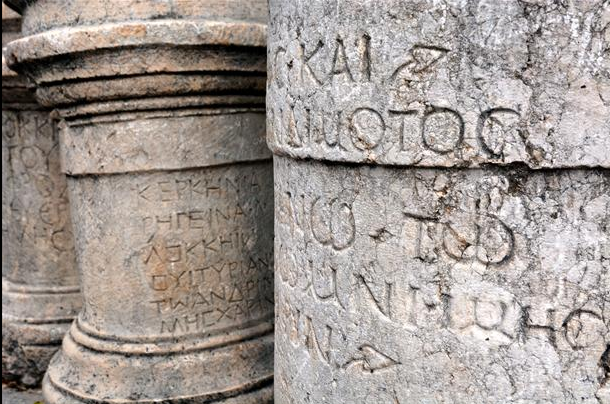
A mother of eight, Dilci is a born-and-bred resident of Dilekkaya, where the ruins of Anavarza or Anazarbus, a city founded by Assyrians that thrived under the Roman empire, are located. Remains of the city's glory days are scarce, with just a small portion of the city walls still standing.
 Dilci and her husband have always been keen to preserve the history in their environs, and this led to the discovery of Anavarza's ancient history, for which the couple was duly awarded. They were building a new house in the village in the 1960s when they stumbled upon a mosaic piece at the construction site.
Dilci and her husband have always been keen to preserve the history in their environs, and this led to the discovery of Anavarza's ancient history, for which the couple was duly awarded. They were building a new house in the village in the 1960s when they stumbled upon a mosaic piece at the construction site.

"We notified authorities and they came. The mosaic we found was a 'fish mosaic' - a Roman-era artifact - and they awarded us TL 500. They asked us to build our house in another, place nearby. We started digging in that place to lay the groundwork but again, we discovered another mosaic," Hatun Dilci says.

Spending everything they had on the construction, the family was broke and without a telephone in the village, they had to travel to the city to inform authorities. They decided to do it, and sold two chickens they had to cover travel fees and went to Adana.

"We met the governor and traveled back to the village with him and with officials from a museum in Adana. They examined the mosaic and told us that we had found the Princess Mosaic," she says, referring to a mosaic believed to depict the daughter of a king.

This time, authorities offered them more money or an assignment of the family as guards of the ancient city. "We chose guarding the site. They gave my husband a uniform and a gun and a monthly salary," she adds.

Hatun Dilci accompanied her husband in guarding the site and personally guarded the site long after her husband's death 22 years ago. Now, one of her sons looks after the site while Dilci preserves the artifacts in the garden of her house.

They started moving the sarcophagi, statues and numerous artifacts to their garden in a bid to protect them from treasure hunters frequenting the area. Under a special deal, the authorities allowed them to keep the artifacts as a small museum, as the area does not have enough space.

"I gave my life to this ancient city. I have been threatened by smugglers and treasure hunters. They tried to burn down my house and poisoned my livestock. I confronted the villagers damaging the ruins. I did this out of my sacred duty toward the state. I am retired now, but I still volunteer. I am still awake at night guarding against theft," she says.
Source: Anadolu Agency [June 01, 2015]